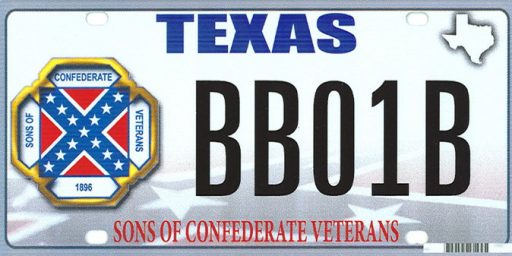Mental Illness, The Law, And Individual Rights
Are we heading toward an era where a diagnosis of mental illness becomes an instrument for state oppression?
Yesterday, I touched on some of the concerns for both individual rights and personal privacy raised by the efforts of politicians on both sides of the political aisle to place a greater regulatory focus on the issue of mental illness and its connection to violence. Today, a guest blogger at law professor Jonathan Turley’s site raises some additional concerns about giving the state greater ability to intrude into the lives of people, over guns or any other issue, based on a diagnosis of “mental illness”:
What is mental illness? It’s a hot topic in the news recently, because of proposed gun control legislation. I saw a photo yesterday of people holding up a huge sign saying, “Keep guns out of the hands of mentally ill.”
There is far more to the demonization of the mentally ill than just the firearms issue. It spills over into the Federal Aviation Administration and the Department of Transportation. It is not just guns; it is airplanes and trucks as well. This brings us to the core question of, “What is mental illness?” The Diagnostic and Statistical Manual of Mental Disorders, Fourth Edition, Text Revision (DSM-IV-TR) is the current handbook for classifying mental disorders. DSM-V is in the final stages of development and will be published in May 2013. That is only next month.
The post goes on to make this important point about the ability of legislators to make decisions on an issue that even doctors don’t necessarily agree on, and what that means for individual rights:
When some of the most prominent mental health experts in the world cannot agree what mental illness diagnoses are, how are lawmakers, judges and law enforcement officers supposed to know? Is being transgendered a mental illness? How about homosexuality—oops, never mind, they took that out of the DSM-IV. There are many people with bipolar disorder walking around and you will never know it, especially if they are taking their medication. Should a person with well-controlled bipolar disorder be allowed to drive an 18 wheel truck, fly a light airplane, or own firearms?
It is interesting that the FAA has created a new class of aircraft, call Light Sport Aircraft” or LSA, which do not require an FAA medical certificate to fly. A light sport pilot may fly with a valid and current driver’s license. Glider pilots can exercise the privilege without a medical certificate.
This brings us to driver’s licenses. If a person, who is taking Xanax or some mild anti-depressant is not allowed to own firearms or fly a Cessna 172, why can they drive? An average automobile or pickup truck weighs almost two tons. They drive on two-lane roads at 55 or 60 mph. That means on a two-lane road, they are passing within two to four feet of each other with a closing speed of about 120 mph.
Just what is mental illness, and where is that bright line drawn for different activities and privileges of ownership? Think about it. Your physician has to give you a formal diagnosis in order to write a prescription for any medication. Almost any Primary Care Physician, especially family doctors, will tell you that a large percentage of their patients are receiving medications for diagnosed psychiatric conditions. The most common are depression and anxiety, either situational or endogenous.
(…)
Legislation and administrative rules that limit rights are already having negative effects on people with mental health issues. They do not get treatment, or ask their doctor for advice. Sometimes they lie. Sometimes a patient will show up, insist on paying cash, register under a John Doe alias, give a vacant lot as an address and use 888-88-8888 for a Social Security number. Most people who need mental health medications or treatment refuse to seek help. If anyone thinks that is a good thing, they are not paying attention.
(…)
HIPAA is supposed to keep your records private, but they are accessible with a court order. Alternately, any agency issuing a license or certificate can insist on the applicant signing a HIPAA complaint medical release form. Sign the form or you do not get your license. One must always beware the Law of Unintended Consequences.
All of the issues raised here are well-taken. I raised similar concerns in the series of posts both Steven Taylor and I did in the wake of the Gabby Giffords shooting and the rather obvious fact that Jared Lee Loughner was a person with serious mental health issue who never sought, or was never referred to, the kind of professional care that might have been able to help him, and prevent a tragedy. [See here, here, and here] At the same time, though, there are some excellent points raised here about the dangers of using a diagnosis of “mental illness” as justification for depriving individuals of their rights, or limiting their ability to earn a living. After all, if, as in the New York case, being prescribed anti-anxiety drugs is justification for taking away someone’s guns (keeping in mind that that determination was reversed by a judge), what would it mean for, say, keeping such a person employed as a teacher? Now, obviously, in that second situation the person in question is protected by a union contract. However, if state law determines that someone is mentally unfit to own a gun, why should that same person be fit to be along in a classroom with ~20-25 students? If that person is a physician or an attorney,why should they be fit to treat patients or represent clients? Indeed, if,under the state’s criteria for “mental illness” one meets the test, why shouldn’t we just lock you up and force you to under go the treatment necessary to make you “better.”
This, I would submit, is the biggest problem with the strategy that the National Rifle :Association and other gun rights organizations are pursuing by trying to argue that the post-Newtown debate should be focused on mental illness instead of what may or may not be loopholes in the nation’s gun laws. As I’ve noted before, history is replete with examples of authoritarian states using “mental illness” as a means for suppressing dissent. There are also plenty of examples from our own history of the horrible treatment that mentally ill people have been subjected to in the past. By making “mental illness” an enemy rather than an disease that should be treated, groups like the NRA are actually becoming more of an enemy of individual liberty than they can possibly imagine.







We can’t even figure out what consciousness is, let alone determine where the line is between healthy and unhealthy thought. The arbitrary nature of psychiatric diagnosis has been used as a tool of oppression before, and it will be again.
Well, the real problem is the push to take rights based on some diagnosis or prescription instead of through a due process which would require an adjudication before a judge.
But the desire in these efforts is to capture those with dangerous mental illness before they are recognized. An impossibility so bureaucrats, etc. start grasping for “indicators” without any actual knowledge.
Worse, in education we get the extremes but little reasonableness. Teachers and administrators freak out, humiliate and lock down the whole school district when a 6-yr old bites a pop tart into an “L” shape. But others, not only ignore but give good grades to stories from kids about murder and other tragedies, that soon become reality. The proper response isn’t SWAT or some moron teachers college graduate melting down, a quiet interdiction by a team with both mental health professionals and law enforcement with no “zero tolerance” unless there is real risk.
“We’re back in the USSR! You don’t know how lucky you are, boys! Back in the USSR!”
-The Beatles
The New York case was, admittedly, a bit of an eye opener to me. Not so much in terms of realizing the need to get treatment for those with severe metal illness, but how these laws could be taken in a bad direction.
What is a mental illness? Asperger’s Syndrome (duh duh duh) is a perfect case. Even if you take it as a condition with needs to be treated (which many people argue that it doesn’t need to be), it’s not so much an illness as a set of social and cognitive impairments. Yet, it’s in the DSM-V, so let’s hope that entire guide doesn’t become the standard by which “mental illness” is defined, or almost everybody will have a mental illness.
Doug,
As the original author, thanks for picking this up and spreading it around. I am a forensic psychologist with over 40 years working with the legal system. I am also a pilot and have had my own battles with the FAA as I got older. Who knew that living long enough to draw Social Security was a serious medical condition?
I got the inspiration for this from three sources. A couple of days ago I saw a photo of an anti-gun protester holding up a sign demanding that guns be taken away from the mentally ill. The second inspiration came from the FAA requirements for a medical certificate to hold a pilot’s license. The third was several emails from veteran’s advocates concerned about not being able to talk vets with deep psychological wounds into getting help. The act of getting help might cost them their job, hunting license, or pilot’s license. All those factors coming together raises the endless question of what constitutes a problem so serious that a person’s civil rights must be compromised or removed entirely.
Check out this this righteous rant from the comment thread.
If life were fair, the horse would get to ride half the time.
Not sure the idea nothing can be done to keep people having mental issues from packing state-of-the-art firepower is going to fly. Suggest something that you will accept, libertarians. If it’s “nothing”, might as well be honest about it, at least to yourselves, because everybody else will figure that out anyway… sooner or later.
@JKB:
I find it odd to be agreeing with JKB on anything.
I think we need to be very clear in crafting laws about where we start limiting rights, as well as how that determination will be made, and how it can be appealed.
It seems preposterous to set the line at “has ever been prescribed anti-depressants or anti-anxiety medicines,” but at the same time we probably want something lighter weight than what is required to commit someone involuntarily.
Imprisoning someone in a hospital has a much greater impact on their liberties than taking away their guns, and much greater consequences if done too readily. If your guns were impounded for 6 months while you appeal, you can still hold down a job, pay your mortgage, see your family, etc.
I’m ok with having the medical provider being the first step in this process — but I wouldn’t trust the many different doctors to provide a consistent standard. I’d want an automatic review process with judicial oversight, straightforward enough to not be a significant burden on the patient’s finances (toss in a second appeals process, where the patient might want to bring in a lawyer), and seal the records.
But, overall, we would want to ask a few critical questions: would this discourage more people from seeking help, to the point where more people are killed from these rules than are saved? And, can we do it while respecting the patient’s rights?
The NRA can’t win for losing. The POTUS, the liberal media, and virtually the entire Democrat Party apparatus are dancing on the graves of dead kids and falling all over themselves in a mad rush to push through a partisan agenda of big government gun control and somehow the blog post author here determines that it’s the NRA! that’s really treading dangerous waters. Is Republican Derangement Syndrome a mental illness? Should it be in the DSM?
In any event, “mission creep” and the law of unintended consequences are real concepts. Nowhere do they apply more directly than in the arena of gun rights and anti-gun rights legislation. The obviously solution simply is not to allow government and legislation by emotion. Fat chance, however. We’ve devolved to a point at which we elect our government largely via emotion, along with racial and tribal identities. Bad legislation leading to mission creep and unintended (and most unwanted) consequences not only is inevitable it’s de rigueur. All part and parcel of the grisly U.S. decline.
I don’t think the NRA cares one bit about possible civil rights infringements. They’re nothing but a front-man shill for the gun manufacturers. Anything that helps sell more guns is gravy to them. The only reason they’ll bitch is because people judged to be unfit to own guns will supposedly find it more difficult to purchase guns. (Unless we have a clearinghouse database, mandate checking, and there is serious liability for straw purchasers or lackadasical sellers who don’t check, this sort of feel-good law will do nothing.)
Supported by 92% of the country…fool. Do you know what partisan means?
The people that gave us electro-shock therapy and strait-jackets should have no role in regulating anything or anyone. They have a financial interest in “diagnosing” imaginary conditions. This is a massive conflict of interest.
Must we always use the “scream” painting when talking about mental illness? Just because EVERYONE does it?
The NRA’s goal is that everyone should be able to buy and carry around any gun anywhere, any time. Mentally ill people screw up that picture, because mentally ill people inconveniently mass murder people with gun industry’s most desirable and expensive toys.
The reality based solution-proven to work all over the world-would be to limit access to the most deadly firearms , either through bans or by requiring that those would want such weapons pass heightened background checks ,complete a training course, or else have a good reason to have such weapons.
The NRA approach is to lock up the mentally ill or otherwise take away their rights. “Guns don’t kill people, mentally ill people kill people”.Anything but do something that will limit gun sales.
@Gustopher:
It’s important to understand that there is nothing in New York’s SAFE Act that even mentions medication. The relevant provision states:
This entire “doomsday” scenario is based on a dumb overreach by a county agency, which was quickly reversed by a trial court judge. If you combine with a large dose of right wing gun nut paranoia, then you get a “gun confiscation program” and all kinds of concerns about a possible Soviet-style presecution of dissidents using pyschiatry. I say let’s take a step back and look at what ACTUALLY happened before we start talking about the United Soviet States of America.
I’ve spent a lot of time around people who suffer from serious mental illness. I don’t claim to have the answers, but I can tell you with absolute certainty that there are a lot of people out there that we don’t want anywhere near a gun.
I can only speak to California, but it’s pretty difficult to get someone conserved here – doubly so because of budget issues. The people I have interacted with that are conserved are profoundly impaired to non-functional. They were not living in the suburbs, holding down a job and paying the mortgage before they lost their freedom. Their lives had fallen apart and they had reached a point where there were very possibly a danger to themselves or others.
Actually, bill, I’m not sure there has been an uptick. Last I saw a graph charting mass shootings, it was chaotic but not really up or down. It just bounced around a lot. Granted, how the creator of the chart defines “mass shooting” matters.
As for institutionalization, by which we mean committing people against their will, that’s always going to be tricky. Overdone and it’s an offense against liberty. Underdone and you have lots of dysfunctional people out on the street. I don’t have a good answer.